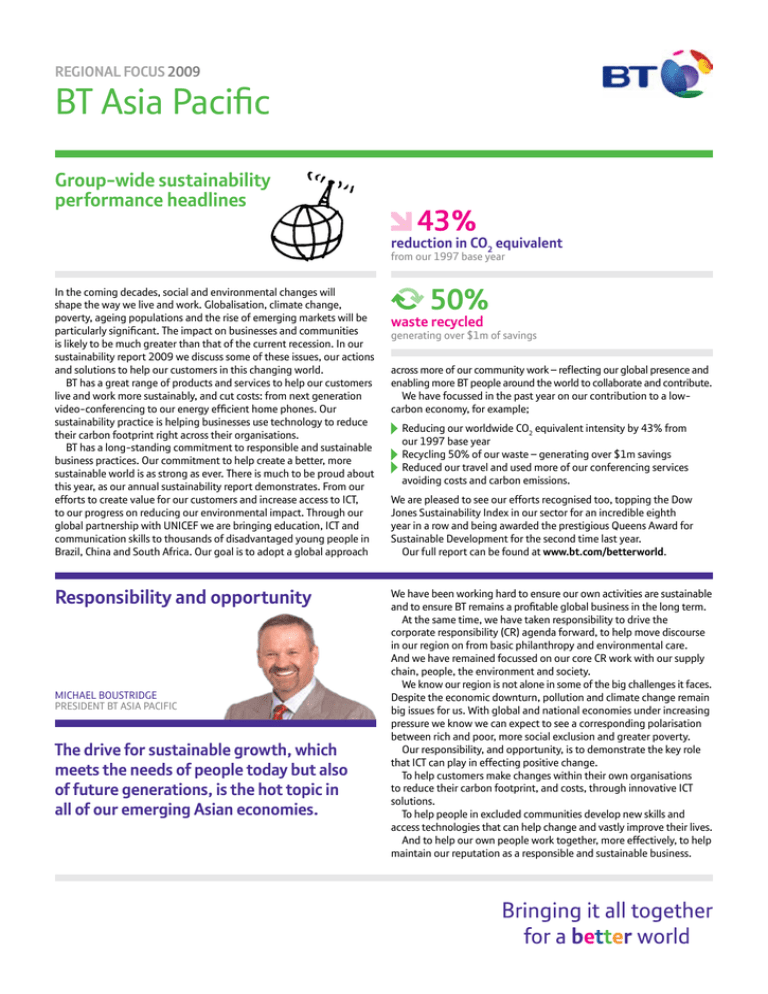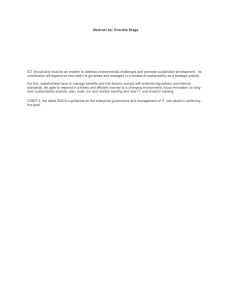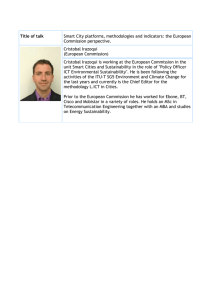BT Asia Pacific 43% 50%
advertisement

REgional focus 2009 BT Asia Pacific Group-wide sustainability performance headlines 43% reduction in CO2 equivalent from our 1997 base year In the coming decades, social and environmental changes will shape the way we live and work. Globalisation, climate change, poverty, ageing populations and the rise of emerging markets will be particularly significant. The impact on businesses and communities is likely to be much greater than that of the current recession. In our sustainability report 2009 we discuss some of these issues, our actions and solutions to help our customers in this changing world. BT has a great range of products and services to help our customers live and work more sustainably, and cut costs: from next generation video-conferencing to our energy efficient home phones. Our sustainability practice is helping businesses use technology to reduce their carbon footprint right across their organisations. BT has a long-standing commitment to responsible and sustainable business practices. Our commitment to help create a better, more sustainable world is as strong as ever. There is much to be proud about this year, as our annual sustainability report demonstrates. From our efforts to create value for our customers and increase access to ICT, to our progress on reducing our environmental impact. Through our global partnership with UNICEF we are bringing education, ICT and communication skills to thousands of disadvantaged young people in Brazil, China and South Africa. Our goal is to adopt a global approach Responsibility and opportunity Michael Boustridge President BT Asia Pacific The drive for sustainable growth, which meets the needs of people today but also of future generations, is the hot topic in all of our emerging Asian economies. 50% waste recycled generating over $1m of savings across more of our community work – reflecting our global presence and enabling more BT people around the world to collaborate and contribute. We have focussed in the past year on our contribution to a lowcarbon economy, for example; Reducing our worldwide CO2 equivalent intensity by 43% from our 1997 base year Recycling 50% of our waste – generating over $1m savings Reduced our travel and used more of our conferencing services avoiding costs and carbon emissions. We are pleased to see our efforts recognised too, topping the Dow Jones Sustainability Index in our sector for an incredible eighth year in a row and being awarded the prestigious Queens Award for Sustainable Development for the second time last year. Our full report can be found at www.bt.com/betterworld. We have been working hard to ensure our own activities are sustainable and to ensure BT remains a profitable global business in the long term. At the same time, we have taken responsibility to drive the corporate responsibility (CR) agenda forward, to help move discourse in our region on from basic philanthropy and environmental care. And we have remained focussed on our core CR work with our supply chain, people, the environment and society. We know our region is not alone in some of the big challenges it faces. Despite the economic downturn, pollution and climate change remain big issues for us. With global and national economies under increasing pressure we know we can expect to see a corresponding polarisation between rich and poor, more social exclusion and greater poverty. Our responsibility, and opportunity, is to demonstrate the key role that ICT can play in effecting positive change. To help customers make changes within their own organisations to reduce their carbon footprint, and costs, through innovative ICT solutions. To help people in excluded communities develop new skills and access technologies that can help change and vastly improve their lives. And to help our own people work together, more effectively, to help maintain our reputation as a responsible and sustainable business. REgional focus 2009 BT Asia Pacific Case studies Wherever we operate around the world, our commitment to help create a better, more sustainable world is clear. We are proud of what has been achieved in our region this year. Driving the corporate sustainability agenda in India November 2008 saw the launch of a new BT initiative to identify the top sustainability challenges facing India today and to measure how well companies in India are achieving sustainable development in their business operations. BT’s Sustainable Development Index (SDI) – an assessment of business performance in India – was developed in partnership with GlobeScan, an independent public opinion and stakeholder research company. Its publication follows a survey of senior opinion leaders and IT employees in India. The SDI is a means of assessing the current performance of the corporate sector in India in its progress towards sustainable development – and of helping companies prioritise the right actions for maximum impact. The SDI report findings indicated that, although the Indian corporate sector is taking positive steps towards sustainable development, its overall performance is disappointing. The report also reveals some clear opportunities for BT to play a role and demonstrate leadership in this area. www.bt.com/betterworld/indiaindex Little by Little When it comes to energy saving, little things all add up towards making a real change. The Korea-based ‘Little by Little’ Carbon Club set out to raise awareness about reducing energy consumption in the workplace, and was honoured in the Global Achievement category of BT’s Carbon Club of the Year Award for its work. Carbon Clubs are a way that BT colleagues can take action on climate change issues and make a difference in their communities. BT Korea people who leave their PC switched on overnight or a monitor running are asked to make a nominal financial contribution as a reminder to switch to less wasteful habits, and contribute to a more sustainable workplace. As well as saving energy, the money raised from the scheme has enabled the purchase of china mugs for the office to help cut down on the use of paper cups. The club also took part in the fifth Energy Day Campaign in August which promotes the switching off of air conditioning systems for one hour and lights for five minutes on the day. Collaborating to bridge the digital divide in India Lifelines India – BT’s digital inclusion partnership with Cisco and One World South Asia – has been recognised with a major industry award. The telephone helpline service for rural Indian communities collected the Association of Strategic Alliance Professionals (ASAP) 2009 Award for Social Responsibility in February 2009. Lifelines India, which officially launched in 2006, is BT’s first international digital inclusion programme. The social and economic benefits for India’s rural farming community are very evident and the partnership has helped create a sustainable business model that can be applied to other similar projects both in India and beyond. Winners of ASAP’s alliance excellence awards exemplify alliance best practices, innovation and organisational impact, often developing novel approaches to achieving results through collaboration. The award organisers said they were “deeply impressed” by the work done by the partnership in India. “Of particular note were the business-savvy design of the collaboration, the complementary nature of the partners and, especially, the significant, measurable impact on your clients,” they said. BT is also helping to bridge the digital divide in India through its support for schools in underprivileged areas of Delhi (KITES) and Pune (St Crispin’s). Greener future for BT Singapore BT Singapore was set for a greener future when 300 of its people moved into new environmentally-conscious offices in September 2008. The office move has aimed to encourage greener practices but has also saved thousands of pounds with a range of initiatives created with its regional facility partner Johnson Controls. BT Singapore recycled up to 80% of its furniture from its former offices when it moved to new premises in a neighbouring district of Chai Chee. It also sourced new furniture locally and purchased carpets made from recyclable material. Energy efficiency in the new building has also been maximised with electrical sensors and timers installed in meeting rooms and general work areas and all taps with controlled water pressure and sprinkler heads. The ideas were a collaboration of a BT project team, Johnson Controls facility and project management teams, and the design and build contractor – Interimage Construction. The project started as a discussion about saving operating costs, but gradually evolved into a wider review of responsible sourcing of equipment and supplies. Energy saving initiatives in the new building include lighting and light fittings which reduce consumption by up to 30%. A further switch-off has been organised for suitable electrical equipment, which are fitted with timers and will be turned off at times when not needed.




